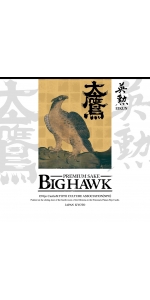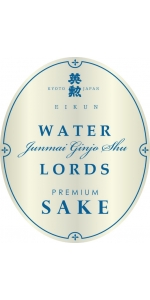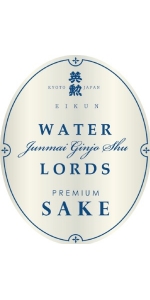Wine from Water Lords (Eikun)
Water Lords (Eikun)
Saito Shuzo Co. Ltd.
The Water Lords (Eikun) Brewery
Eikun, also known as Saito Shuzo Co. LTD., founded in 1895, is located in the Fushimi region of Kyoto Japan

In 1905 during the Taisho period in Japanese history, the "EIKUN" sake was adopted as the company's corporate brand name. Since then, the finest quality sake has been produced by Saito Sake Brewer known as "EIKUN" which is acknowledge today as the finest Sake produced in the Fushimi district of Japan famously known to sake lover for its premium brewed sake.
Over the years, the company has become a leader in the sake industry and the pioneer for the development of quality premium sake in Japan.
ushimi region is home to 30+ other breweries due to the quality of its water source. This soft water plays an instrumental part in creating smooth and balanced sake. With its moderate climate and beautiful natural surrounding in Kyoto greatly contributes to the delicate and quality taste of Saito Sake and captures the essence of premium sake quality at its best.
The major sake production areas in Japan are:
- Kobe – Nada-GÅgo largest area of sake production
- Kyoto (Fushimi) – home to the big brewery and museum of Gekkeikan + 30 other breweries or Kura, too.
- Niigata – largest number of Kura at 90+
- Akita – northern sake region called Tohoku
Sake Rice and Water
Unique to the region of Kyoto is Iwai rice which is only used by Kyoto sake producers. In fact, Eikun purchases 40% of all Iwai rice produced.
Eikun sake uses water from a source called "Fusui", rated as one of the top 100 sources of water in Japan. This water source is located just south of the ancient Japanese, and still cultural capital of Japan, Kyoto.
Food and Sake in Kyoto
Kyoto is home to many Shinto shrines and a particular type of cuisine called Kaiseki. Kaiseki is a sequence of small and artistically arranged dishes, both beautiful in presentation and flavor.
"Kaiseki" in Kyoto cuisine is all about "Dashi (broth)" and it’s "Umami". So the taste of food is elegant, and they don't usually put a lot of soy sauce or salt in Kyoto cuisine.
Therefore, the sake flavor is kind of gentle and soft to match with local Kyoto cuisine.
This western area of Japan around Kyoto blends sake and culture into a perfect marriage.
Eikun Sake isn’t just known at the consumers market level, but it is also very well received at traditional high end Japanese restaurants though out Japan where people come to enjoy the traditional taste of Japanese cuisine and to enjoy the unique experience of Eikun Sake.
Best of the Best Sake
Each year since the 1890’s there is a competition "Shinshu Kanpyou-Kai" (National New Sake Competition) now called National Competition, which judges sake quality. Eikun has received the gold medal for their sake an unprecedented 14 years in a row.
Only 20-25% of all Kura receive gold medals each year.
In addition, no Kura or brewery has received the award 14 times consecutively. The National Competition is attended by 90% of all 1300 Kura in Japan and is for Daiginjo grade products only.
About Kyoto
The City of Kyoto was founded as "Heiankyo" in 794 A.D. It flourished as the capital of Japan for approximately 1,000 years and was the birth site of the quintessential Japanese culture and traditions one finds throughout the country today.
Even after the transfer of the capital to Tokyo during the Meiji Restoration in 1868, Kyoto maintained its position as Japan's cultural capital. It is home of various national treasures worthy of global pride as well as many historical buildings and traditional arts and crafts. Kyoto's rich and colorful history, combined with its geographic and climatic factors have created a city with a very unique blend of tradition, culture, and industry. Kyoto was laid out in a grid pattern with the Imperial Palace located at its center.
Rice milling: 60%
Rice varietal: Iwai (Only available in Kyoto)
Alcohol: 15%
Sake meter value: +3.0
Acidity: 1.3
Tasting Notes: --------
Eikun sake uses water from a source called "Fusui", rated as one of the top 100 sources of water in Japan. This water source is located just south of the ancient Japanese, and still cultural capital of Japan, Kyoto.
Review:
"Clear with a platinum blue cast. Aromas of coconut milk, melon, pear and rice pudding with a with a supple, dry-yet-fruity medium body and a vanilla, apple, and pepper accented finish. A robust and lively sake that will sing with spicy Asian cuisine."
- Beverage Testing Institute (July 2nd 2014), 91 pts
Sake Eikun Junmai Ginjo Water Lords 12/720ml is made with Iwai rice.
Eikun sake uses water from a source called "Fusui", rated as one of the top 100 sources of water in Japan. This water source is located just south of the ancient Japanese, and still cultural capital of Japan, Kyoto.
Aromas of macadamia oatmeal cookie, spicy zucchini bread, and vanilla cream with a satiny fruity-yet-dry medium-to-full body and a layered, banana custard, jicama, salted whole nut, apple, and radish nuanced finish. A Wonderfully vibrant and flavorful sake.-Beverage Tasting Institute 94 points (Exceptional)
RATING: 94 points (Exceptional)
CATEGORY: Junmai Ginjo Sake, Sake
ALCOHOL BY VOLUME: 15.3%
TASTING LOCATION: In Our Chicago Tasting Room
TASTING DATE: Dec-05-2012
WINE ID: 200768
Made with Iwai rice.
Eikun sake uses water from a source called "Fusui", rated as one of the top 100 sources of water in Japan. This water source is located just south of the ancient Japanese, and still cultural capital of Japan, Kyoto.
Rice milling: 60%
Sake Eikun Junmai Ginjo Water Lords is made with Iwai rice.
Eikun sake uses water from a source called "Fusui", rated as one of the top 100 sources of water in Japan. This water source is located just south of the ancient Japanese, and still cultural capital of Japan, Kyoto.
Aromas of macadamia oatmeal cookie, spicy zucchini bread, and vanilla cream with a satiny fruity-yet-dry medium-to-full body and a layered, banana custard, jicama, salted whole nut, apple, and radish nuanced finish. A Wonderfully vibrant and flavorful sake.-Beverage Tasting Institute 94 points (Exceptional)
RATING: 94 points (Exceptional)
CATEGORY: Junmai Ginjo Sake, Sake
ALCOHOL BY VOLUME: 15.3%
TASTING LOCATION: In Our Chicago Tasting Room
TASTING DATE: Dec-05-2012
WINE ID: 200768
- back
Selected Options
Wineries
Categories
Pricing
Countries
Regions
Grape Types
Wineries
Organic/Free Shipping
All older vintage wines have been purchased from a single collectors cellar. Pictures can be requested before shipment.
Nickel & Nickel Truchard Vineyard Chardonnay is made from 100 percent Chardonnay.
The 2023 Nickel & Nickel Truchard Chardonnay opens with enticing aromatics of tropical fruit, tangerine, and a hint of honeysuckle. On the palate, it presents a bright and vibrant profile, with a natural lift from its fresh fruit flavors and lively acidity. The tropical and citrus notes are complemented by a subtle brioche character, while the oak imparts a pleasant roundness, bringing balance and weight to the wine.
Review:
The freshness and pure fruit flavors of this generous wine ring clear as a bell. Crisp green apples, Bosc pears and subtle oak spices like vanilla bean and toasted almonds fill the palate. While medium-bodied, it feels full and generous and has a lingering finish. Drink now or hold.
-James Suckling 94 Points
Winemaker Joe Harden ages his Truchard Vineyard Chardonnay for 10 months in 30% new French oak, with minimal stirring and no malolactic fermentation, allowing for a slightly more pronounced oak presence. Truchard, one of Carneros' most esteemed sites, is characterised by rolling hills with ideal sun exposure and cooling breezes. Harden sources fruit from eight distinct blocks across the vineyard’s expansive 109 hectares, with harvests spanning roughly a month. Among the selections is Clone 809, a Muscat clone that adds floral aromatics and a touch of baking spice. The Truchard Chardonnay exhibits a silky texture on the palate, layered with citrus peel and tropical hints of apricot and peach. A rich spine of acidity is further heightened by vivid mineral tension, creating a wine that is both racy and rich. Elegantly balanced, it’s a delightful sipper with impressive depth and vibrancy.
-Decanter 94 Points







